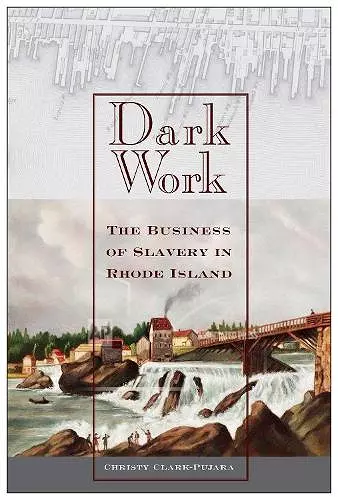Dark Work
The Business of Slavery in Rhode Island
Format:Paperback
Publisher:New York University Press
Published:6th Mar '18
Should be back in stock very soon

Tells the story of one state in particular whose role in the slave trade was outsized: Rhode Island
Historians have written expansively about the slave economy and its vital role in early American economic life. Like their northern neighbors, Rhode Islanders bought and sold slaves and supplies that sustained plantations throughout the Americas; however, nowhere else was this business so important. During the colonial period trade with West Indian planters provided Rhode Islanders with molasses, the key ingredient for their number one export: rum. More than 60 percent of all the slave ships that left North America left from Rhode Island. During the antebellum period Rhode Islanders were the leading producers of "negro cloth," a coarse wool-cotton material made especially for enslaved blacks in the American South.
Clark-Pujara draws on the documents of the state, the business, organizational, and personal records of their enslavers, and the few first-hand accounts left by enslaved and free black Rhode Islanders to reconstruct their lived experiences. The business of slavery encouraged slaveholding, slowed emancipation and led to circumscribed black freedom. Enslaved and free black people pushed back against their bondage and the restrictions placed on their freedom. It is convenient, especially for northerners, to think of slavery as southern institution. The erasure or marginalization of the northern black experience and the centrality of the business of slavery to the northern economy allows for a dangerous fiction—that North has no history of racism to overcome. But we cannot afford such a delusion if we are to truly reconcile with our past.
"Overall, Christy Clark-PujarasDark Work: The Business of Slavery in Rhode Islandis thought-provoking." (The New England Quarterly) "Dark Workis an excellent study on the importance of slavery in the economy of Rhode Island." (H-Net Reviews) "This superb work should be read by anyone interested in early American race relations or New England history." (Choice) "[This] author's sharply focused monograph exploring the impact of slavery on Rhode Island's black population is a valuable addition to the historiography that now assumes the centrality of slavery in the North and the compatibility therein of capitalism and slavery." (Historian) "Dark Work is a sweeping overview of the African American experience in Rhode Island from the colonial period through the Civil War... a valuable resource." - Agricultural History "Clark-Pujara's work (the first study to take enslaved people, and slavery and its legacy in Rhode Island, as its primary focus) demonstrates just how central slavery was to the Rhode Island economy, both before Rhode Island passed its gradual emancipation law in 1784, and for many decades after... Dark Work is an engaging, sophisticated monograph that does vital work in writing enslaved and free African American Rhode Islanders back, both into the history of "big" national and local events of the American Revolution, the Dorr Rebellion, and the Civil War, and into "small" histories of daily life in Rhode Island (documenting African Americans' ongoing efforts to control their lives, in a system fundamentally opposed to them doing so). An elegant, insightful work of scholarship." - Journal of American Ethnic History "It is well-known that Rhode Island's mercantile and manufacturing economies served the larger Atlantic plantation complex, but Clark-Pujara asks an important new question: how did the black freedom struggle unfold in a place materially invested and implicated in the expansion of human bondage across in the Americas? Clark-Pujara reconstructs the lives and livelihoods of black Rhode Islanders, for whom the violence of enslavement, the prospects of emancipation, and the limits of freedom unfolded in accordance with the demands for food in the Caribbean, for slaves in the Carolinas, and for clothing in Louisiana." - Seth Rockman,Brown University "This timely and innovative study of of slavery and African American life in Rhode Island reveals the simultaneous development of slavery and capitalism in the Age of Revolution. Especially eye-opening are the sagas of white Rhode Island families profiting from the Atlantic slave trade and internal commerce after the American Revolution. Countering the financial power of local powers of slavery were the continued struggles, fully explored through the Civil War by Christy Clark-Pujara, by African Americans to create community and expand their civil rights." - Graham Russell Gao Hodges,George Dorland Langdon, Jr. Professor of History and Africana Studies, Colgate University
ISBN: 9781479855636
Dimensions: unknown
Weight: 318g
224 pages